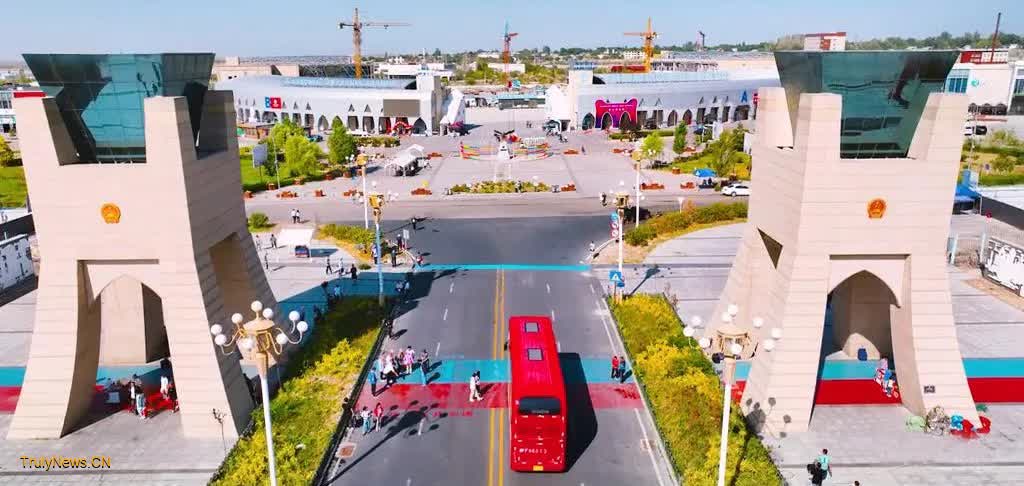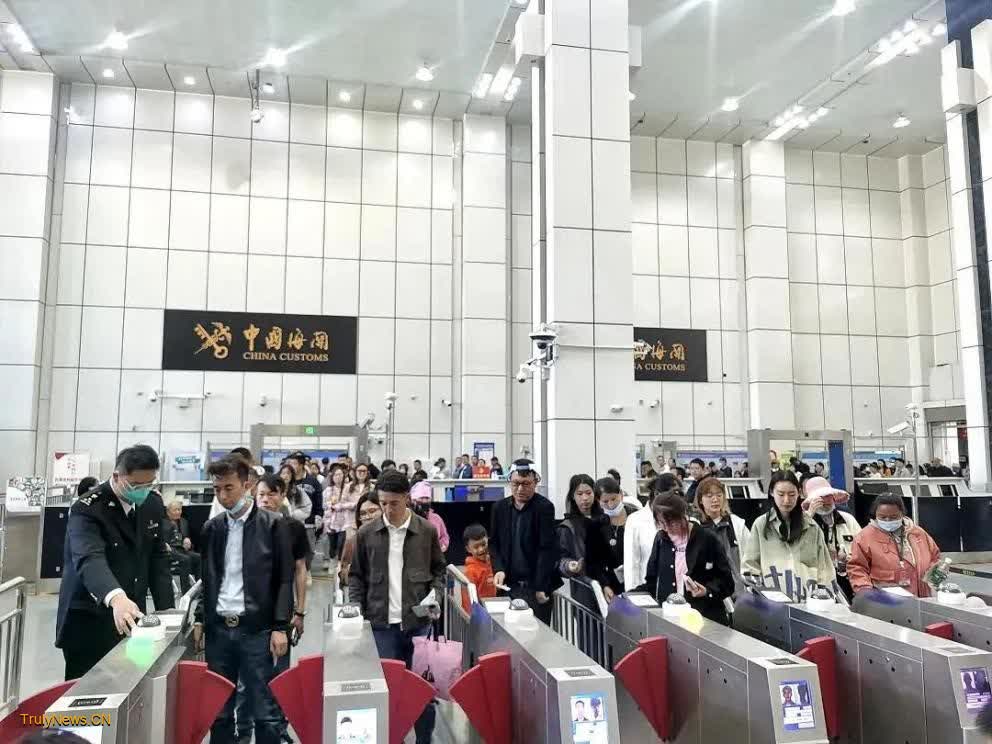
Photo shows the China-Kazakhstan Horgos International Border Cooperation Center. (Photo from the public account of China Railway on WeChat)
The opening ceremony of the Kazakhstan Year of Tourism in China in 2024 was recently held in Beijing. China and Kazakhstan will hold a series of splendid activities throughout the year of tourism, which include art performances and tourism forums.
Kazakhstan boasts abundant tourism resources, such as the Shymbulak Ski Resort, Lake Kaindy, Charyn Canyon, the Korgalzhyn State Nature Reserve, and the National Park Burabay, attracting a large number of tourists every year.
The Kazakh government has set a goal to increase domestic tourist visits to 11 million and foreign tourist visits to 4 million by 2030. Besides, the number of people employed in the tourism industry is expected to reach 800,000 by that time.
Kazakh Minister of Tourism and Sports Yermek Marzhikpayev said that China is one of Kazakhstan’s priority tourism markets and partners, owing to the two countries’ geographical proximity and profound historical connections.
Kazakhstan plans to attract more Chinese tourists by leveraging its rich nomadic culture, centuries-old history, and unique natural landscapes, the minister added.
In recent years, China and Kazakhstan have witnessed continuously deepening tourism cooperation. In November 2017, China officially set up a tourism office in Astana, which was the first one of its kind established by China in a Central Asian country. The office has played an active role in promoting cultural and tourism exchanges between the two countries. In November 2023, mutual visa exemption between China and Kazakhstan was implemented, further stimulating the travel demand of tourists from both sides.
Since the beginning of this year, the number of Chinese tourists traveling to Kazakhstan has been on the rise, making the Central Asian country an emerging popular outbound travel destination.

Tourists line up at the departure lobby of the China-Kazakhstan Horgos International Border Cooperation Center in northwest China’s Xinjiang Uygur autonomous region on May 1, the first day of the five-day May Day holiday. (Photo/Xiao Qinqin)
According to statistics from Chinese online travel agency Ctrip, the number of tourism bookings to Kazakhstan by Chinese tourists this year has increased by 229 percent year on year, and 262 percent compared to 2019.
Data from another Chinese online travel platform Fliggy showed that since March, the number of flight bookings to Kazakhstan has increased more than threefold from a year ago. Almaty, Astana and Aktau are especially favored by Chinese tourists.
“Currently, Chinese tourists can take direct flights to Kazakhstan from Beijing, Xi’an, Hangzhou, and Urumqi, or enter the country through land ports in Xinjiang Uygur autonomous region. Natural scenery and local culture are major attractions,” said Xu Jia, general manager of a travel agency in Sichuan province.
Xinjiang is adjacent to Kazakhstan. Therefore, some Chinese tourists would have a tour in the autonomous region first and then go to Kazakhstan via places like Horgos.
It is reported that the Horgos international highway bus station has four international passenger routes to Kazakhstan, and with the arrival of the peak tourist season, there has been a significant increase in the number of tourists traveling between China and Kazakhstan.
The China-Kazakhstan Horgos International Border Cooperation Center located in the Horgos Area of the China (Xinjiang) Pilot Free Trade Zone is always bustling with activities. The cooperation center spans the border between China and Kazakhstan, covering a total area of 5.6 square kilometers.
Citizens of China and Kazakhstan, as well as third countries, can enter or leave the cooperation center visa-free for up to 30 days, which facilitates face-to-face business negotiations, trades, tourism and shopping.
The passage connecting China and Kazakhstan in the cooperation center has become a popular photo spot for tourists.

Photo shows the exhibition booth of Kazakhstan at the 2023 China Outbound Travel and Tourism Market held in Beijing in November 2023. (Photo from the Kazakhstan Embassy in China)
It is reported after the cooperation center resumed full operation in 2023, the number of tourists has shown an exponential growth. It handled a total of 4.18 million inbound and outbound tourist visits throughout the year, a year-on-year increase of 4.27 times.
This year, the cooperation center has once again experienced a peak in cross-border tourism and shopping, with tens of thousands of tourists entering and leaving the cooperation center every day.
Marzhikpayev said that the Kazakhstan Year of Tourism in China is a milestone event that helps strengthen the friendly relations between the two countries.
“We believe that the dialogue between the two sides will inject new vitality into the partnership in the tourism sector, open up new prospects, and lay the foundation for fruitful long-term cooperation,” the minister noted.
Kairat Batyrbayev, executive director of the Eurasian International Studies Association in Kazakhstan, said that China’s outbound tourism is booming and it is expected that more Chinese tourists will choose to travel to Kazakhstan in 2024.
This will help drive the development of Kazakhstan’s tourism industry and promote the upgrading of supporting infrastructure such as roads, hotels, and restaurants, Batyrbayev noted, adding that Chinese tourists gaining a deeper understanding of Kazakh culture, customs, and food will further deepen the cultural exchange between the two countries.